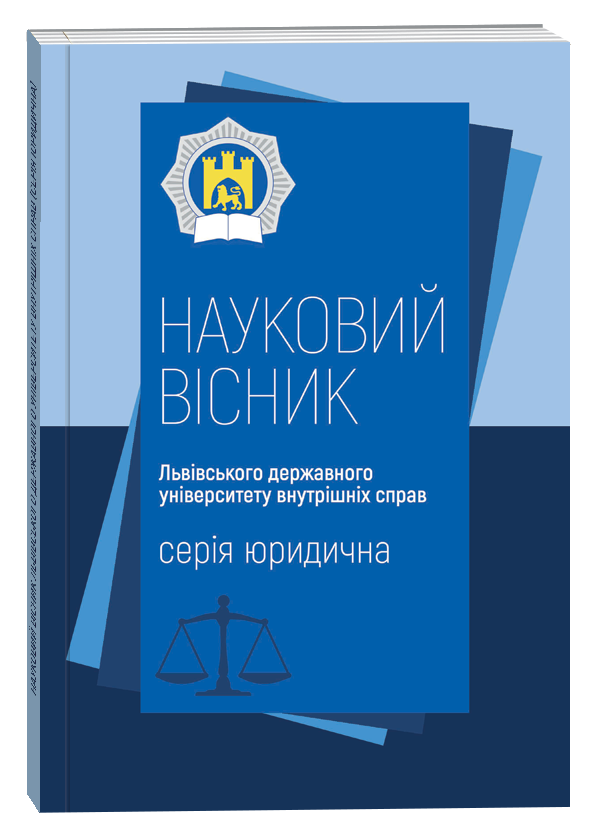ПРИЙНЯТТЯ ПРОПОЗИЦІЇ, ОБІЦЯНКИ АБО ОДЕРЖАННЯ НЕПРАВОМІРНОЇ ВИГОДИ СЛУЖБОВИМИ ОСОБАМИ ЯК НАЙПОШИРЕНІШЕ КОРУПЦІЙНЕ ПРАВОПОРУШЕННЯ
DOI:
https://doi.org/10.32782/2311-8040/2025-3-17Ключові слова:
корупція, кримінальна відповідальність, неправомірна вигода, антикорупційна культура, службова особа, доброчесність, прозорість, корупційні діяння, злочинАнотація
У цій статті розглядається правова природа прийняття неправомірної вигоди службовими особами, а також особливості кваліфікації цього діяння відповідно до чинного законодавства України як найпоширенішого корупційного правопорушення у службовій сфері. Особливу увагу приділено аналізу механізмів протидії цьому явищу, які включають і превентивні заходи, й ефективне розслідування та притягнення винних до відповідальності. Адже лише системний підхід до боротьби з корупцією може забезпечити її поступове викорінення та відновлення довіри громадян до держави. Вказано, що ця проблема вимагає не лише посилення кримінально-правового реагування, але й формування антикорупційної культури, що базується на принципах доброчесності, прозорості та відповідальності. Підкреслено, що корупційні правопорушення, пов’язані з прийняттям пропозиції, обіцянки або одержання неправомірної вигоди службовими особами, мають серйозний вплив на суспільні відносини та функціонування державних інститутів, маючи численні негативні наслідки, з-поміж яких: 1) підрив довіри до держави (громадяни втрачають віру в здатність державних органів діяти в їхніх інтересах, що може призводити до соціальної напруги та політичної нестабільності; 2) економічні втрати (корупція створює додаткові витрати для бізнесу та громадян, знижує ефективність використання бюджетних коштів і стримує інвестиції); 3) нерівність і дискримінація (особи, які не готові платити хабарі, можуть бути позбавлені доступу до певних послуг чи можливостей); 4) гальмування реформ (корупційні практики перешкоджають впровадженню реформ, спрямованих на модернізацію державного управління та поліпшення якості життя громадян). Зауважено, що важливим напрямом протидії корупції є превентивні заходи, спрямовані на формування антикорупційної культури у суспільстві. Це передбачає посилення освітніх ініціатив, спрямованих на підвищення обізнаності громадян про негативні наслідки корупції, а також розвиток механізмів громадського контролю за діяльністю службових осіб. Ефективна боротьба з цим видом корупції можлива лише за умови вдосконалення законодавчої бази, підвищення ефективності правоохоронної діяльності та активного залучення громадянського суспільства до процесів моніторингу та контролю.
Посилання
Мартинов Д. Ю., Обушна Н. І. Феномен корупції в системі публічного управління: теоретичні аспекти наукового дискурсу. Державне управління: удосконалення та розвиток. 2020. № 8. URL: http://www.dy.nayka.com.ua/?op=1&z=1720
Кікалішвілі М. В. Західноєвропейські моделі стратегії протидії корупційній злочинності. Вчені записки ТНУ імені В. І. Вернадського. Серія «Юридичні науки». 2019. № 6. Т. 30 (69). С. 124–130.
Мовчан А. В., Мовчан М. А. Основні причини поширення корупційних явищ в органах державної влади України. Проблеми антикорупційної діяльності в Україні : зб. матер. Міжнар. наук.-практ. конф. (Київ, 18 травня 2015 року) / МАУП. Київ : МП «Леся», 2015. C. 73–76.
Боднарчук О. Г. Усунення корупційних ризиків як ключовий фактор у боротьбі з корупцією у сфері виконання покарань. Науковий вісник Міжнародного гуманітарного університету. Серія «Юриспруденція». 2013. № 6-2. Том 1. С. 84–87.
Про запобігання корупції : Закон України від 14 жовтня 2014 року № 1700-VII. Відомості Верховної Ради України. 2014. № 49. Ст. 2056.
Кримінальний кодекс України від 5 квітня 2001 року № 2341-ІІІ. Відомості Верховної Ради України. 2001. № 25–26. Ст. 131.
Ушканенко Е. О. Криміналістична характеристика прийняття пропозиції, обіцянки або одержання суддями неправомірної вигоди. Право і суспільство. 2024. № 2. С. 532–540.
Шумейко Д. О. Прийняття пропозиції, обіцянки або одержання неправомірної вигоди службовою особою: проблеми правової кваліфікації. Юридичний часопис Національної академії внутрішніх справ. 2015. № 1. С. 39–51.
Возняковська К. А., Біленець Д. А., Марчук В. В. Антикорупційні механізми у системі публічного адміністрування як засіб боротьби з організованою злочинністю в сфері господарювання. Науковий вісник Ужгородського національного університету. Серія «Право». 2024. Вип. 84. Ч. 3. С. 43–48.
Палюх А. Я., Коломієць Д. С., Шишова О. М. Удосконалення законодавства у сфері запобігання та протидії корупції в умовах євроінтеграційних процесів. Право та державне управління. 2023. № 2. С. 56–62.
Навроцька Ю. С., Пашов Р. І. Запобігання корупції та забезпечення доброчесності як запорука розбудови громадянського суспільства. Інвестиції: практика та досвід. 2024. № 20. С. 258–262.
Єсімов С. С. Адміністративно-правові засоби запобігання корупції. Проблеми вдосконалення діяльності правоохоронних органів щодо виявлення, припинення та превенції корупційних проявів : матеріали постійно діючого науково-практичного семінару (м. Львів, 28 травня 2021 року) / упорядник Ю. А. Хатнюк. Львів : Львівський державний університет внутрішніх справ, 2021. С. 22–25.
##submission.downloads##
Опубліковано
Номер
Розділ
Ліцензія

Ця робота ліцензується відповідно до Creative Commons Attribution 4.0 International License.









